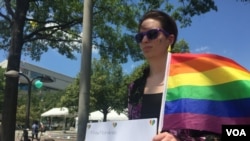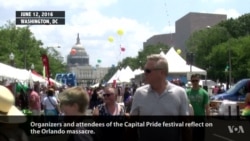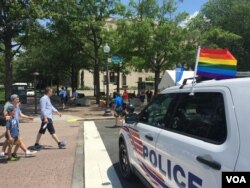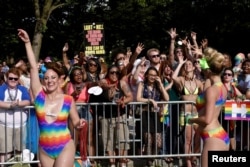It's LGBT Pride month, with parades and concerts celebrating the gamut of sexuality and gender identity every weekend around the U.S. and the world.
In the middle of Washington's festivities, on the final day of the Capital Pride festival, news filtered through social media that the worst mass shooting in U.S. history took place inside a gay nightclub in Florida.
Undaunted but with increased security, the festivities did not stop – except for a few seconds of silence from the crowd.
Behind purple sunglasses and a handwritten sign, Isis Rose stood quietly on the edge of Pennsylvania Avenue in downtown Washington on Sunday afternoon as people walked by with rainbow colored everything, from head to toe.
'Heartbreaking'
"#heartbroken #Orlando #Freehugs" she had scribbled on a small placard.
"The night of so many cities' pride parades – to have such a deadly attack is just heartbreaking," she said, sniffling to hold back tears. "It's more important than ever to stand together. It shows us what's out there, and what the stakes are."
Rose understands that for some people, continuing the weekend party into the steamy Sunday afternoon was an act of defiance in the face of fear. For her, though, she needed – and wanted – to do more. With her sign in hand, she stood silently and hugged fiercely when people approached for an embrace.
It was an attack by one man on a club and on the city of Orlando that left at least 50 people dead and scores more wounded. But it was an attack, many festival goers said, on the wider LGBTQ community.
"This was a deliberate attack on the LGBT community. It wasn't random. He didn't walk into any old nightclub. He walked into a gay nightclub in the middle of Pride month," says Kevin Naff, editor of LGBT newspaper The Washington Blade. "We were targeted."
After a few seconds of silence at the beginning of an afternoon concert, the street fair continued.
Police presence
Organizers and volunteers felt the additional police presence while thousands of people strolled a stretch of Pennsylvania Avenue, a main artery through downtown Washington from that runs from the Capitol building to the White House.
"People are a little nervous and concerned about our security, but it's good to see that people are here and we will continue," Naff noted.
Just as in the aftermath of the massacres before it in Paris or Boston or New York, being in public on Sunday was seen as an act of defiance by people at the event.
"It gave me the urge to come out more, to show my support, be strong, (and) come together as a community," said Dave Galpern.
Pride weekend, he said, is when "I don't have to hide who I am."








